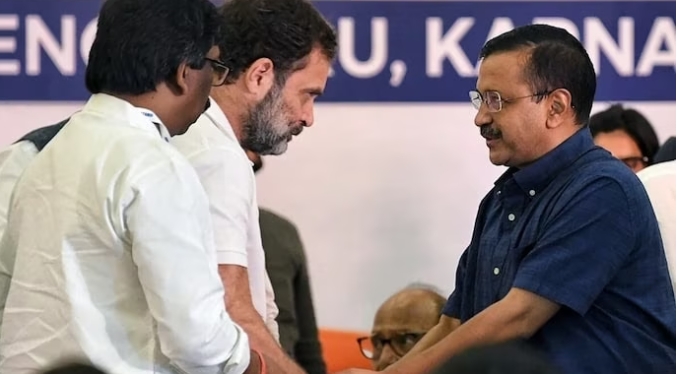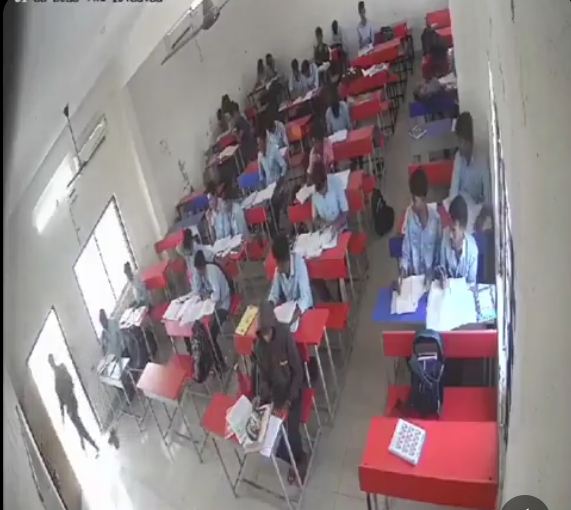By The Sampadak Express
As the Delhi Assembly elections approach, the Congress party finds itself in a pivotal position—one that could shape its future political relevance. While Congress has little to lose in these elections, its performance will significantly influence its standing in the years ahead. In a surprising turn of events, Congress has recently severed ties with the Aam Aadmi Party (AAP), its ally in the INDIA bloc, accusing AAP of being no different from the Bharatiya Janata Party (BJP). This shift has reignited tensions and added a new layer of complexity to the long-standing rivalry between Congress and AAP, stirring political dynamics in the national capital.
Congress Targets AAP as Its ‘Arch Enemy’The Congress party, under Rahul Gandhi’s leadership, has taken a more aggressive stance against Arvind Kejriwal and his AAP. Gandhi’s vocal criticism of Kejriwal during a recent rally in Seelampur marked a significant escalation. This move is part of a well-planned strategy, as Congress believes that in order to challenge the BJP effectively in the future, it must first neutralize AAP, a party that has emerged as a direct competitor at the cost of Congress’s dominance in Delhi.
Since AAP’s rise in Delhi, Congress’s fortunes have drastically declined. Once a major political force with over 40% of the vote share, Congress saw its support plummet to just 24.5% in the 2013 elections, further shrinking to 9.6% in 2015 and an abysmal 4.2% in 2020. This decline mirrors the rise of AAP, which secured over 50% of the vote share in both the 2015 and 2020 Assembly elections—54.3% in 2015 and 53.5% in 2020.
Targeting Key Constituencies: Focus on 20-25 SeatsIn the face of numerous internal challenges—including a shortage of workers, lack of organizational strength, factionalism, and low morale—Congress has accepted that it cannot contest all 70 seats in the upcoming elections. Instead, the party is focusing on around 20-25 constituencies where it believes it has a realistic chance of success. These include constituencies such as Badli, Seelampur, Seemapuri, Kasturba Nagar, Sultanpur Majra, Matia Mahal, Ballimaran, and Okhla. By zeroing in on these areas, Congress hopes to regain some political ground and present a formidable challenge to AAP.
A Strategic Appeal to Minority Voters
One of Congress’s primary strategies is to win back its traditional voter base, particularly the minority community, which it feels has been alienated by Arvind Kejriwal’s handling of the 2020 Delhi riots. Rahul Gandhi’s visits to violence-affected areas during the riots highlighted his commitment to addressing the concerns of the minority community. In the upcoming elections, Congress is prioritizing these issues, with Muslim candidates raising them during their campaigns.
Rahul Gandhi’s emphasis on the Constitution and inclusivity has resonated deeply with Muslim voters, who perceive him as a staunch advocate for their rights. Additionally, Priyanka Gandhi’s public show of support for Palestine has further solidified Congress’s image as a party committed to secular values. In the 2020 elections, Congress secured 13% of the Muslim vote, while AAP garnered 83%. This time, Congress aims to turn the tide by focusing on constituencies with significant Muslim populations, hoping to reclaim some of these votes.
Exposing AAP’s Governance FailuresCongress’s campaign is sharply focused on exposing AAP’s failures, particularly in the areas of governance and corruption. Rahul Gandhi has been at the forefront of these attacks, using social media to mock Kejriwal’s claims of transforming Delhi into a “Paris” while highlighting issues like garbage accumulation in the city. Gandhi has also gone so far as to compare Kejriwal and Prime Minister Narendra Modi, accusing both leaders of engaging in the same style of governance that overlooks corruption and mismanagement.
The Congress party believes that this direct confrontation with AAP will resonate with voters who are frustrated with the current administration. By painting AAP as just another version of the BJP, Congress hopes to appeal to floating voters and those disillusioned with the state government’s performance.
Leveraging Anti-Incumbency Sentiment
Congress is also banking on a growing anti-incumbency sentiment among Delhi voters, accusing AAP of misgovernance and corruption. By positioning itself as an alternative to both AAP and the BJP, Congress aims to tap into the frustrations of voters who feel that neither party has delivered on their promises.
The party has been vocal about the rising costs of basic services, such as electricity, water bills, and ration cards. In an attempt to undermine Kejriwal’s honesty image, Congress has included the controversial ‘Sheeshmahal’ issue in its campaign songs, which highlight the public’s anger over the administration’s handling of these issues.
Sheila Dikshit’s Legacy vs. Kejriwal’s Rule
While the attack on AAP’s governance is a central theme, Congress has also started invoking the legacy of former Chief Minister Sheila Dikshit, hoping to contrast her tenure with Kejriwal’s. Sandeep Dikshit, Congress’s candidate from New Delhi, pointed out that the public is increasingly frustrated with AAP’s tendency to blame the Centre and the Lieutenant Governor (LG) for governance failures. According to him, this constant blame game has led to stalled public services, further eroding public trust in the current government.
He also criticized Kejriwal for taking credit for work done by Sheila Dikshit, alleging that the current Chief Minister falsely flaunts her achievements as his own. Congress is now positioning itself as the party that can restore “Old Delhi,” a period when governance was more stable under Dikshit’s leadership.
Congress’s Fight for Relevance
As Congress takes on AAP in the upcoming Delhi Assembly elections, its strategy is clear: defeat AAP and reassert its relevance in the city’s politics. Whether the party can regain its footing in Delhi’s complex political landscape will depend on its ability to harness discontent with the AAP government and reengage with its traditional voter base. The election outcome will serve as a crucial barometer for Congress’s political future, not just in Delhi but in its broader national ambitions as well.
Related articles:






